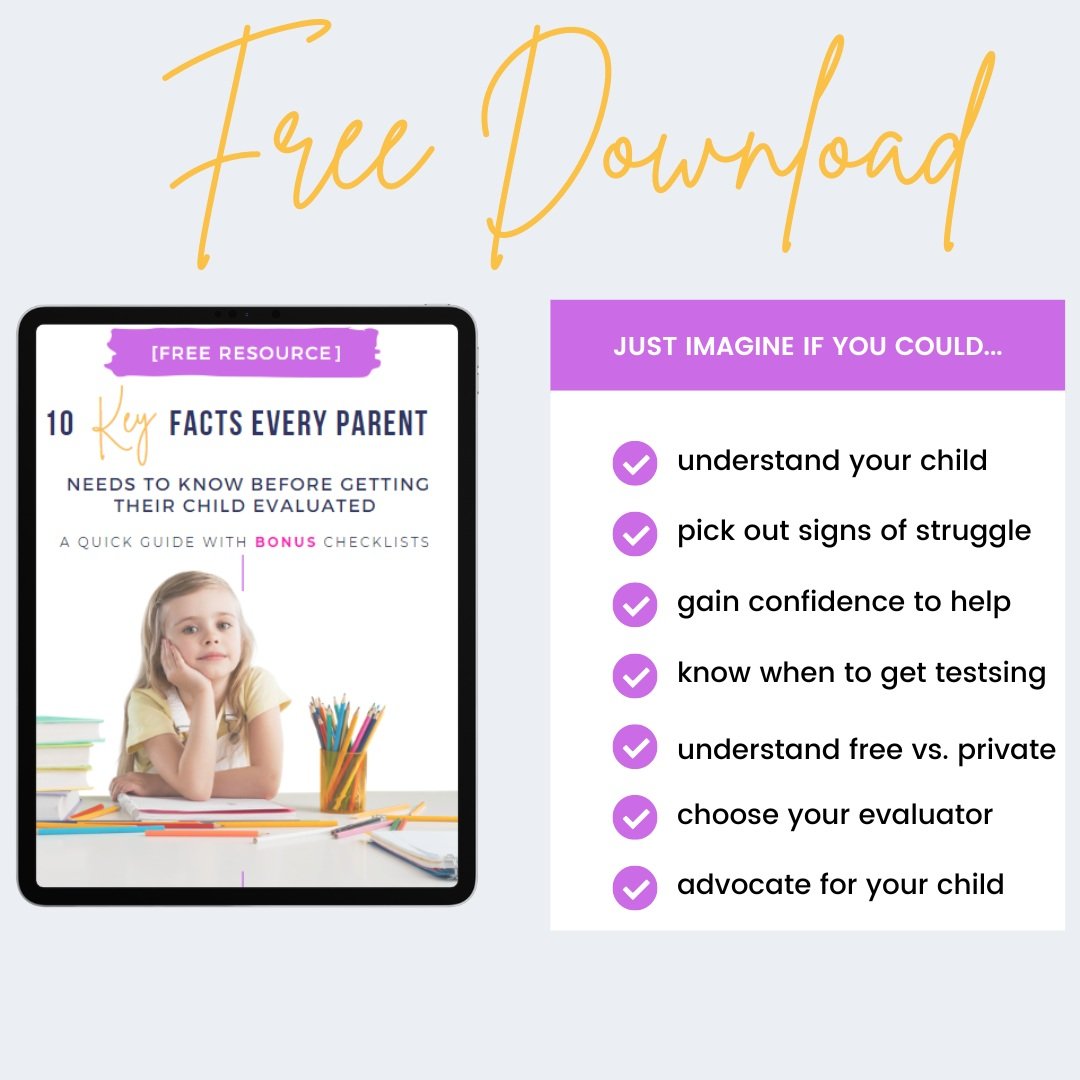Could My Child Have Dyslexia or Another Learning Disability?
As a parent, it's natural to be concerned about your child's learning abilities and to wonder if they might be facing challenges like dyslexia. Knowing when to opt for a learning disability screening versus a full evaluation is essential to provide the right support. Let’s look at a familiar example:
What grades, screenings, and evaluations tell us. . .
Grades:
Like a Temperature Check: Just as you'd use a thermometer to monitor a fever, watching grades or observations about homework could point to whether there might be an "academic temperature" that's slightly off—signaling potential learning difficulties, such as dyslexia, dyscalculia, or dysgraphia. Also, if you are a homeschool parent and you rely more on gauging your child’s involvement in learning, any avoidance of a task might be an indicator that they’re struggling!
Learning Disability Screening:
Like a Strep Swab: Think of a learning disability screening as a quick, targeted check, much like swabbing for strep throat when your child complains of a sore throat. It's perfect for addressing specific concerns and mild issues in your child's learning.
1. Specific Concerns: If you've noticed specific issues in your child's learning, like persistent difficulty with reading, writing, spelling, or related skills, a screening may be the first step.
2. Mild or Isolated Issues: When the problems are mild or seem confined to a particular area, such as reading, and aren't affecting overall academic performance or other aspects of your child's development, a screening may be sufficient.
3. Quick Assessment: A learning disability screening can quickly assess whether a learning disability, such as dyslexia, might be a factor in your child's learning challenges.
Why consider a screening?
- If you want a quick glimpse into possible learning challenges.
- If you want to determine if further evaluation is necessary.
- If you're ready to take the first step towards targeted help.
What screenings can provide:
- Swift assessment through questionnaires and observations.
- A chance for teachers, parents, and students to express concerns.
- Early identification of potential areas for improvement.
Want to know more about Screenings with Clever Cogs?
Full or Comprehensive Evaluation:
Like a Comprehensive Workup or Blood work: When your child's academic struggles feel like more than a common cold, it's time for a full evaluation. This is sometimes called a “Psychoeducational Evaluation”, meaning that both the brain’s ability to process information and how that shows up in learning are considered. This is like visiting a seasoned medical professional for a comprehensive workup when multiple symptoms and issues are at play. Some more things to consider:
1. Symptoms Impacting the Whole System: Just as an ailment can impact various aspects of your body, widespread learning challenges in reading, writing, math, and comprehension can impact your child's academic and social well-being.
2. Chronic Conditions: If your child's learning struggles persist, despite previous interventions or support, it's a sign that a thorough evaluation is needed to uncover any underlying conditions.
3. Professional Expertise: A full evaluation provides a holistic understanding of your child's learning difficulties, much like a medical workup offers insights into an individual's overall health. It can identify not only dyslexia but any co-occurring conditions that might be contributing to the challenges. Not all evaluations are the same.
You’ll want to find an evaluator who can fully explain WHY the struggle exists and HOW to approach it. At Clever Cogs, that’s our specialty. Also, we like to include comprehensive tips and tricks to help make your home-life better.
Can you imagine the difference in the relationship you and your child share if you were able to fully understand how they “see” the world?
Why consider a full evaluation?
- If you want an in-depth understanding of your child's learning style.
- If you're looking for accurate diagnosis and personalized strategies.
- If you're considering tailored learning accommodations.
What evaluations can provide:
- Specific reasons your child ‘gets’ some information and not other information, also known as a pattern of strengths and weaknesses.
- Detailed analysis of cognitive, academic, and behavioral aspects.
- Identification of specific accommodations to enhance learning.
Want to know more about a Full Evaluation with Clever Cogs?
The Takeaway:
A learning disability screening is a great starting point when you have specific or mild concerns. However, if your child's challenges are more pervasive, affecting multiple areas of learning and their overall well-being, it's time to consider a full evaluation.
Remember that consulting with educators, specialists, or healthcare professionals is crucial to determine the best course of action for your child's unique needs. Your child's educational journey is a collaborative effort, and by taking the right steps at the right time, you can ensure they receive the support they require.
Takeaway — Why consider a screening?
Efficiency, early support, and a doorway to customized assistance.
Takeaway —Why consider a full evaluation?
Precise insights, personalized approaches, and dedicated accommodations for support.
👇Want More Guidance? Grab a FREE GUIDE or Schedule a FREE CALL👇
Our FREE guide, 10 Key Facts Every Parent Needs to Know Before Getting Their Child Evaluated,
has been thoughtfully crafted from over 18 years of experience in education and helping children with learning differences succeed. It guides parents of children from PreK to 12th grade by providing:
Clarity: Gain a comprehensive understanding of your child's unique learning needs and challenges.
Information: Learn when and how to seek professional evaluations, and what to expect from the process.
Peace of Mind: Know the signs and symptoms of learning struggles and understand if your child's difficulties are typical or if they need further assessment.
Grab your guide that contains everything you need to advocate for your child confidently.
These tools can help you identify potential underlying issues contributing to your child's learning difficulties and guide appropriate interventions.

